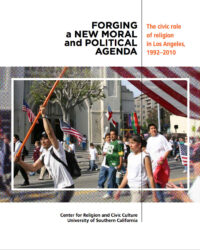The challenges facing the Los Angeles region in the coming years are immense, and we are just beginning to understand them. For example, the economy is slowly recovering from the recession of 2008-2009, and although some economists have declared that the recession is over, others have argued that full recovery will take a decade to attain, if indeed full recovery is possible. The effects of the recession and the slow recovery extend beyond economic issues and impact the everyday lives and futures of individuals, families and communities.
Economist Daniel Flaming, writing in the recently released “Annual State of the City Report,”21 has shown that job losses in the current recession are much more severe in Los Angeles than in other parts of the United States. Flaming argues that with the loss of employment and income, families are “more likely to sink into poverty, require public assistance, lose their homes, experience family dysfunctions, and have increased susceptibility to health problems.”22 However, this is not simply an issue of losing employment. There is also the reality that younger people just coming onto the job market, either from college or high school, may face years of unemployment or under-employment, potentially creating a generational cohort that may never know full-time employment in their lifetime. At the same time, as demographer Dowell Myers has argued, Los Angeles has an increasingly aging population that is moving inexorably toward retirement. Myers shows that the ratio of older Los Angeles residents to working age residents will more than double between 2000 and 2030, resulting in a flood of retirees who will threaten to overwhelm public resources with the needs of aged dependents.23
These developments, brought into sharper relief as a result of the recession and the significant loss of jobs, are symptoms of the increasing inequality of American society. While the immediate needs of food, shelter and clothing are necessary and important concerns, there are also larger social effects that correlate with inequality and present significant challenges to the fabric of life not only in Los Angeles, but in American society generally. For example, recent research suggests that the extreme levels of inequality we are seeing now in the U.S. can undermine social trust and community life, effectively corroding society from the inside out.24 Social unrest and riots are a predictable consequence of failed expectations and dramatic levels of social inequality.
A second challenge facing Los Angeles is immigration. One-third of Los Angeles residents are immigrants, with almost one-half of the workforce foreign born, and two-thirds of those under the age of 18 are the children of immigrants.25 The future of Los Angeles is in large part dependent upon how well these immigrants and their families are successfully integrated into its social, civic and economic fabric. Not only do immigrants and their families represent the future economically—who else will shoulder the burden of paying for the aging baby-boomers?—but they are important more generally in terms of the social and political health of the city. Unfortunately, many barriers block the advancement of immigrants, especially in the area of quality public education, which is the key to better economic opportunities and fuller social participation and civic engagement. Education is the key not only to economic success, but has effects beyond purely financial considerations. For example, college graduates have a much lower unemployment rate than non-college graduates. Also, they are more likely to make it to the middle class, and have more stable marriages and family lives. Hence, improving access to quality public education and encouraging completion of high school and college are not only crucial components to the inclusion and advancement of immigrants into the social fabric of Los Angeles, but to the future of the region.26
A third, perhaps more frightening problem that seismologists describe as inevitable, is the occurrence of a sizable earthquake that will destroy important components of the Los Angeles infrastructure, including roads and buildings, and disrupt daily life for millions of people. In the worst case scenario, portions of the region will be cut off from outside assistance, including communication, medical resources, food and water. Those with a memory of Los Angeles that stretches back to the early 1990s and the Northridge earthquake, or even earlier to the 1970s and the Sylmar earthquake, can remember the collapse of portions of Interstate10 and Interstate 5. With “the big one,” those results may be multiplied many times, and we must ask which institutions in the region will be able to care for the immediate needs that result and assist in recovery over the longer term.
21 “Los Angeles 2010: Annual State of the City Report,” Pat Brown Institute,
California State University, Los Angeles.
22 Daniel Flaming, “State of the Los Angeles Economy,” p. 1, Los Angeles 2010:
Annual State of the City Report, Pat Brown Institute, California State University,
Los Angeles.
23 Dowell Myers, Janna Goldberg, Sarah Mawhorter, Seong Hee Min, “Immigrants
and the New Maturity of Los Angeles,” p. 5-8 in Los Angeles 2010: Annual State of
the City Report, Pat Brown Institute, California State University, Los Angeles.
24 See Richard Wilkinson and Kate Picket, The Spirit Level: Why Greater Equality
Makes Societies Stronger, New York: Bloomsbury Press, 2010.
25 Manuel Pastor and Rhonda Ortiz, “Immigrant Integration in Los Angeles:
Strategic Directions for Funders,” Program for Environmental and Regional Equity,
and Center for the Study of Immigrant Integration, University of Southern
California, January 2009.
26 See Ron Haskins and Isabel V. Sawhill, Creating an Opportunity Society, Washington
D.C.: Brookings Institution Press, 2009.
Richard Flory is the executive director of the USC Center for Religion and Civic Culture.
Brie Loskota is the former executive director (2016-2021) of the USC Center for Religion and Civil Culture.
Donald E. Miller is the co-founder of the USC Center for Religion and Civic Culture.
